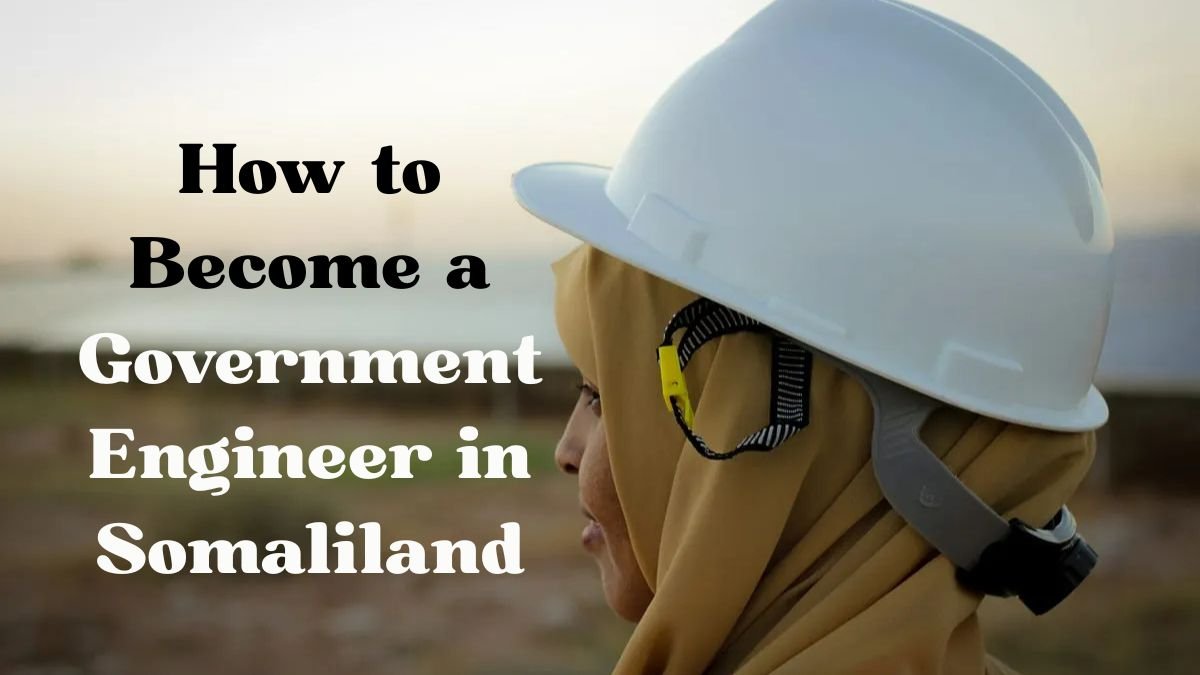Engineering is one of the most respected and lucrative professions in the world. In Somaliland in particular, the government is in great need of qualified engineers as the country focuses on areas such as roads, electricity, water and urban development. If you are a student, graduate or young professional and want a career that is safe, respectable and useful to society – becoming a government engineer could be a great option for you.
In this article, we will tell you what steps you need to take to become a government engineer in Somaliland – from studying to getting a job and how to progress further. We will also provide some actionable advice and examples to help you move faster towards your goal.
Why become a government engineer?
Government jobs have always been a dream for students and their families, and when it involves engineering, this dream becomes even more special. Let’s understand what are the benefits of becoming a government engineer in Somaliland:
- Job security
Government jobs are usually stable – that is, you don’t have to worry about losing your job suddenly. Once you are selected, you can pursue your career for a long time without any stress. - Contribution to nation building
You will not be doing just a job – but you will be a part of the country’s important things like roads, bridges, water pipelines, government schools, hospitals. Your hard work can make the lives of millions better. - Respect and recognition
Government engineers are considered very respectable in the society. People take your work seriously, and you are recognized as a responsible person. - Good opportunities for growth
Promotions happen from time to time in government departments. If you are hardworking, you can rise from a junior engineer to a department director. - Better work-life balance
Government jobs have fixed timings as compared to many private companies. With this, you can also give better time to your family and personal life.
Step 1: Choose the right engineering field
The first and most important decision is which branch (discipline) of engineering you will choose. Some engineering fields are most in demand in the government sectors of Somaliland:
Civil Engineering
Civil engineers are most important for the construction and maintenance of roads, bridges, government buildings, schools.
Electrical Engineering
They play an important role in power generation, transmission lines, and providing electricity to villages.
Mechanical Engineering
Repair of government vehicles, water pump systems, maintenance of machines – all these come under their scope.
Environmental Engineering
Government projects based on garbage management, sanitation system, climate change – engineers of this field are useful here.
Water Resources and Irrigation Engineering
Agriculture, canals, water storage, rural water supply schemes – there is a great need for such engineers in these areas.
Example: If you have seen water shortage in villages and you want to bring about a change in it, then Water Resources Engineering can be a good option for you.
Step 2: Fulfill the required educational qualification
To become a government engineer, you must have a Bachelor’s Degree (BSc) in Engineering from a recognized university.
Key Qualifications:
- Minimum 4-year engineering degree course
- Good grades and strong technical knowledge
- Education from a recognized institution
Major universities in Somaliland:
- University of Hargeisa
- Amoud University
- Gollis University
- Burao University
- Edna Adan University (if you are in biomedical engineering)
Tip: Before starting your degree, make sure the university is recognized by the Somaliland Ministry of Education.
Step 3: Improve your technical skills
Just having a degree is not enough. You must also have certain technical skills to work on government projects.
Technical skills required:
- Designing using software like AutoCAD, Civil 3D
- Project management (like using MS Project or Primavera)
- Operating GPS, GIS Mapping, and survey tools
- Site supervision (monitoring construction sites)
- Creating reports and documents
- Computer basics (MS Word, Excel, PowerPoint)
Example: If you are working on a road project, your work will involve mapping it using AutoCAD and visiting the site to inspect it.
Importance of Internship:
Do an internship in a municipality, government project, or NGO during or after your education. This will give you a chance to learn real work and gain good experience.
Step 4: Apply for government engineer jobs
Now that you have both the education and the skills, the next step is to apply for a job.
Where to find government job advertisements:
- Ministry of Public Works and Housing website
- Civil Service Commission (CSC) website
- Local city council websites (e.g. Hargeisa, Burao)
- Local newspapers and radio (e.g. Geeska Afrika)
- Social media platforms like LinkedIn and Facebook
Application process:
- Read the job advertisement carefully – position, required degree, experience etc.
- Prepare a professional resume and cover letter.
- Attach required documents – degree, transcript, recommendation letter, identity card.
- Written test – on general knowledge and technical subjects.
- Interview – behavioral and technical questions are asked.
Final selection
No – Based on exams and interviews.
Tip: Keep your resume short, clean and filled with technical skills and projects.
Step 5: Prepare for exams and interviews
Some higher positions require competitive exams or departmental screening tests.
Topics to prepare:
- Basics of your engineering branch
- Mathematics and logical reasoning
- Somaliland constitution, geography, recent government schemes
- Computer and drafting skills
Interview questions:
- “What will you do if a road project is not completed on time?”
- “What steps do you take to ensure safety on site?”
- “How will you complete the project if the budget is limited?”
Tip: Practice mock interviews with friends, or attend a workshop.
Step 6: Get professional registration (if required)
Some government departments may ask you to show proof of being registered with an engineering institution. Although this process is still developing in Somaliland, try to:
- Join a local engineering association
- Take courses or membership from international organizations such as ASCE, IEEE
Step 7: Start with NGO or contract work
If you don’t get a government job right away, don’t panic. You can get experience from other places and then move into the government system later.
Alternative ways:
- Work on contract on short-term government projects
- Work on infrastructure projects for NGOs (such as UN-Habitat, Mercy Corps, CARE)
- Take a job with a private company that does government projects
- Advantage: This experience will look good on your resume and help you build a network.
Step 8: Don’t stop learning
Engineering is a constantly changing field. A successful government engineer is one who keeps himself updated all the time.
Learning Methods:
- Take short courses – in project management, environmental engineering, etc.
- Take online certification from websites like Coursera, EdX
- Attend seminars, government conferences
- Improve proficiency in languages like English, Somali, Arabic
How will your career progress?
Once you become a government engineer, your promotion depends on your hard work, honesty and knowledge.
Promotion Ladder:
Junior Engineer → Assistant Engineer → Senior Engineer → Chief Engineer → Director
Tips:
In future, pursue a master’s degree – like in civil engineering, public administration or management, to get promoted to higher positions.
What is the salary of a government engineer?
Salaries vary with experience and position, but roughly:
- Junior Engineer: $300 – $500 per month
- Mid-level (5-10 years): $500 – $800
- Senior/Project Director: $900 – $1500 or more
Benefits:
- Housing or transport allowance
- Pension plan
- Paid holidays
- Government training program
Challenges to consider
Every job has its challenges, including government engineering:
- Lack of resources
- Old equipment
- Budget delays
- Political interference
- Postings in remote areas
But engineers who are dedicated, ethical and know how to find solutions can overcome these problems.
Conclusion: Towards a better Somaliland
Being a government engineer is not just a job – it’s a mission. You become part of the team that delivers a strong infrastructure to the country. If you study on time, learn the right skills and move forward with patience, then one day you can play an important role in the development of your country.







